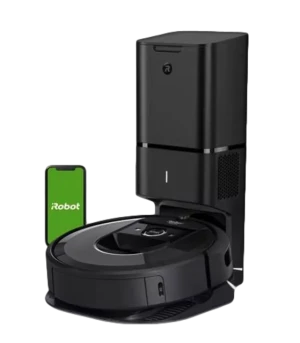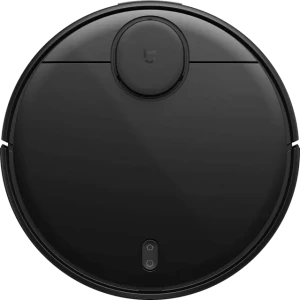iRobot Roomba i7+ cleans all floor types, this is essential, since different rooms within a home may have various types of flooring i.e. carpets. When a robot vacuum is advertised as being able to clean all floor types, this implies that the robot vacuum is designed and equipped to effectively clean most flooring materials without much limitations.
Xiaomi Mi Robot aslo cleans all floor types, meaning it is built to be adaptable, providing best cleaning performance on either carpets or hard floors found in most homes. The vacuum's ability to create a map of its cleaning space is one of the commonly asked-for features. The map it creates allows the robot to keep a record of the layout of the desired space.
This can be used for several purposes, for example the iRobot Roomba i7+ having the mapping feature can provide efficient cleaning in the mapped-out areas without accessing those that are not. iRobot Roomba i7+ has an obstacle sensor, such a sensor serves the purpose of detecting and identifying obstacles in the robot's path, allowing it to navigate around them and avoid collisions. Also, the Xiaomi Mi Robot has this sensor, obstacle sensors work together to provide the robot vacuum with a comprehensive understanding of its environment, making it possible to navigate around furniture, walls, and other objects when cleaning a room thus preventing damage to both the robot and its obstacles.
Many modern robot vacuum cleaners such as the iRobot Roomba i7+ are designed to work with Amazon Alexa, which implies that they can be added to the Amazon Echo ecosystem and programmed using voice commands. The iRobot Roomba i7+ is compatible with Google Assistant, allowing you to control it using voice commands via Google Home devices or the Google Assistant app installed on smartphones and tablets. iRobot Roomba i7+ has a period of 1 year, warranty periods typically range from 1 year to 2 years, however some higher-end models may offer longer warranty periods.
The iRobot Roomba i7+'s dustbin capacity is at 0.4L, dustbin capacity indicates how much dust, dirt, and pet hair the robot vacuum can hold before it needs to be emptied. Xiaomi Mi Robot, at 0.4L
has the same dustbin capacity as the iRobot Roomba i7+
The dustbin capacity varies widely among robot vacuum models, and the size you choose should be based on your cleaning needs and the size of the area you want to clean. iRobot Roomba i7+ weighs 3.4kg, robot vacuums are commonly designed to be lightweight and compact for easy maneuverability and carrying around.
The Xiaomi Mi Robot, at 0.4kg
is lighter than the iRobot Roomba i7+ with a difference of 3kg. It's advisable to take in consideration the weight of the robot vacuum when choosing a model, especially if you plan to carry it up and down stairs
iRobot Roomba i7+ has a width of 339mm, often referred to as its cleaning path width, refers to the width of the area that it can properly clean in a single pass. The width of a robot vacuum is key as it can affect its efficiency and the duration it takes to clean a space
The Xiaomi Mi Robot, at 345mm
measures more in width than the iRobot Roomba i7+ by 6mm.
A wider cleaning path can cover more ground in a single pass, reducing the time it takes to clean a room. iRobot Roomba i7+'s height measures 92mm, here you are considering the measurement from the bottom to its highest point. Height is a key consideration, especially if you have obstacles with limited clearance in your home.
Xiaomi Mi Robot, at 96mm
measures more in height than the iRobot Roomba i7+ by 4mm. When choosing a robot vacuum, ensure that the robot vacuum can fit under the furniture and navigate effectively in your living space without getting stuck or causing damage. The battery power of a robot vacuum cleaner is a crucial factor that determines how long the vacuum can run on a single charge.
Battery capacity is measured in milliampere-hours (mAh), iRobot Roomba i7+'s battery power is 3,300mAh
The Xiaomi Mi Robot, at mAh5,200
has more battery power than the iRobot Roomba i7+ with a difference of
A bigger capacity implies longer battery life which can be of advantage if you have a large space or if you prefer the robot vacuum to complete operations without frequent interruptions to recharge. The operating time of a robot vacuum cleaner refers to the amount of time the vacuum can clean continuously on a single charge before it needs to return to its charging dock for recharging. iRobot Roomba i7+'s operating time is 1.25h
The Xiaomi Mi Robot, at 2.5h
lasts more than the iRobot Roomba i7+ with a difference of 1.25h
Always plan cleaning cycles around the vacuum's operating time to maximize efficiency and prevent "incomplete work" between charge intervals.
iRobot Roomba i7+ has a charge time of 3h, the charge time of a robot vacuum cleaner refers to the amount of time it takes for the vacuum's battery to recharge fully after it has been depleted during a cleaning cycle. The Xiaomi Mi Robot, at 4h
charges for longer than the iRobot Roomba i7+ with a difference of 1h. Charge time is an important factor to consider when choosing a robot vacuum, as it determines how long you'll need to wait before the vacuum begins its next cleaning cycle.
iRobot Roomba i7+ has a dirt sensor, these are designed to detect the availability of dirt, dust, or debris in the space being cleaned and based on their readings adjust the vacuum's cleaning behavior during operation. Self-emptying robot vacuum cleaners like the iRobot Roomba i7+, are advanced robot vacuum models that have a convenient feature to empty their dustbins automatically. iRobot Roomba i7+ supports a smartphone app, that allows you to control and monitor the vacuum without getting to it physically but through your smartphone or tablet.
Both the Xiaomi Mi Robot and iRobot Roomba i7+ have mobile application support, mobile apps enhance your experience by providing convenience, and ease update of features and functionalities. This feature in robot vacuum cleaners is designed to eliminate the likelihood of the robot vacuum becoming stuck during cleaning. Robot vacuums such as the iRobot Roomba i7+ are equipped with various sensors and technologies to move around obstacles and avoid getting trapped, however the effectiveness of this feature varies among different models.
Both the Xiaomi Mi Robot and iRobot Roomba i7+ have the "anti-stuck" feature, but clearing clutter, ensuring proper cable management, and creating clear paths for the vacuums can help further eliminate the chances of getting stuck during cleaning. Virtual barriers are typically set up and controlled through the robot vacuum's mobile app, similar to no-go zones, these barriers are setup to enable you control and restrict where the robot vacuum can and cannot go during cleaning. Both iRobot Roomba i7+ and Xiaomi Mi Robot support virtual barriers, this ability to set virtual barriers is especially useful for homes having areas where the robot vacuum may encounter obstacles.
iRobot Roomba i7+ has a route mapping feature that enables it to create a map of your space and schedule efficient cleaning routes. This mapping capability enhances the vacuum's ability to work effectively and systematically. Route mapping is a valuable feature as it makes it possible for robot vacuums such as the Xiaomi Mi Robot to adapt to the layout of your home to work more efficiently and reduce the possibility of missing certain spots.
Auto-docking is a feature in robot vacuum cleaners that refers to the vacuum's ability to return to its docking station when predetermined conditions are met such as done with cleaning, battery running low, or any malfunction. Both Xiaomi Mi Robot and iRobot Roomba i7+ support this feature, considered a convenient feature because it ensures that the robot vacuum keeps its charge and readiness for cleaning without requiring manual intervention. Most robot vacuum cleaners such as iRobot Roomba i7+ come equipped with an "cliff detection" feature.
This feature is intended to save the robot vacuum from falling off stairs, ledges, or other elevated surfaces, thus its safety while cleaning. This safety feature that is also available on the Xiaomi Mi Robot is essential in mitigating accidents and keeping the robot vacuum from damage. It gives you peace of mind by ensuring that the vacuum will not fall off a ledge during its cleaning cycle.
iRobot Roomba i7+ has this convenient feature, which enables you to set certain days or times of day for the robot vacuum to automatically start working. The scheduling feature in robot vacuums is specifically useful in maintaining a consistently clean home without the need for manual intervention. Xiaomi Mi Robot too allows scheduling.

